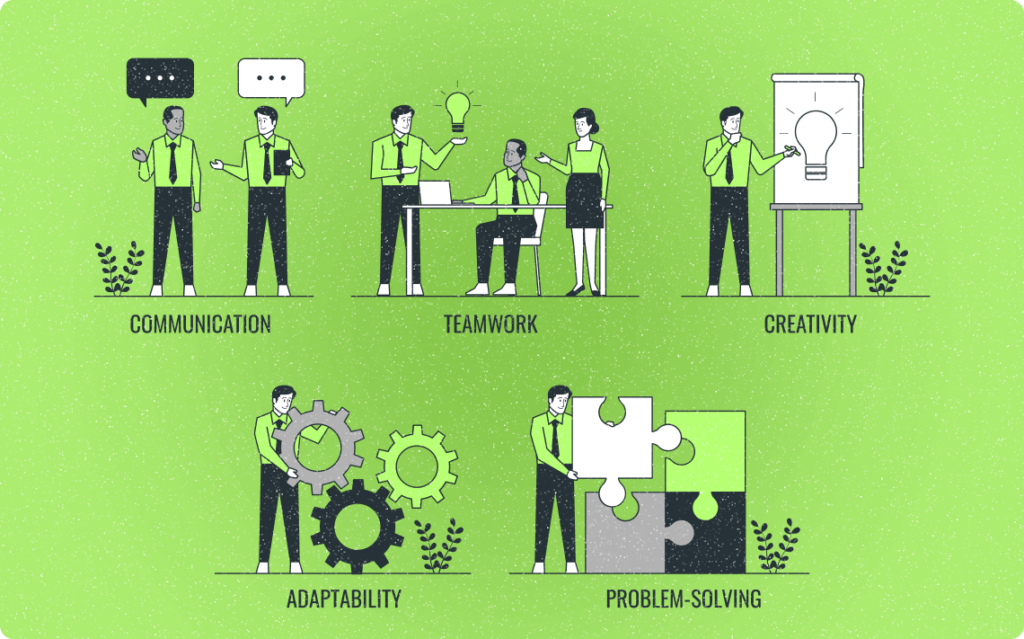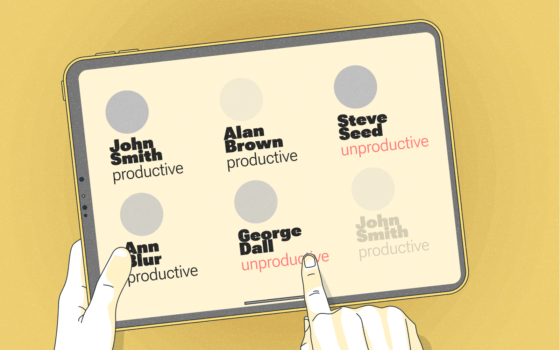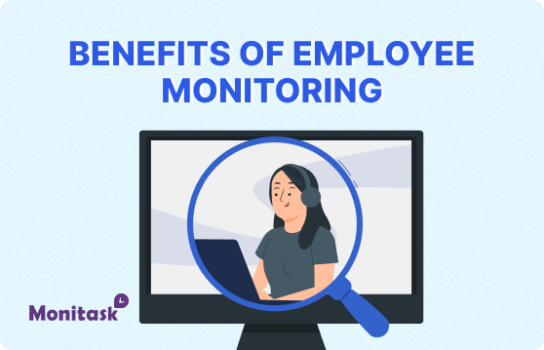12 Self-Management Skills and How to Develop Them

In today’s fast-paced and demanding world, the ability to manage oneself effectively is a crucial determinant of personal and professional success. Self-management skills allow individuals to control their behaviors, thoughts, and emotions in ways that lead to positive outcomes. Whether you’re navigating the challenges of a busy workplace or striving to meet personal goals, mastering self-management can make all the difference. This article explores what self-management skills are, outlines twelve essential self-management skills and how to improve them, discusses their importance in the workplace, and introduces tools like Monitask that can help you enhance these skills.
What Are Self-Management Skills?
Self-management skills are the abilities and practices that enable individuals to control their behaviors, thoughts, and emotions in a way that helps them achieve their goals. These skills are essential for maintaining discipline, making thoughtful decisions, managing time effectively, and responding to challenges with resilience. Self-management is not just about keeping your life in order; it’s about taking proactive steps to improve your performance, well-being, and relationships.
In essence, self-management involves setting goals, planning, monitoring progress, and adjusting behaviors to ensure that you stay on track. It requires a combination of self-awareness, self-discipline, and the ability to manage stress. People with strong self-management skills are typically more productive, reliable, and able to handle the demands of both personal and professional life with greater ease.
Get more out of your business
Get the best employee engagement content every week via mailing list

12 Self-Management Skills and How to Improve Them
1. Goal Setting
Description: Goal setting is the ability to define clear, specific, and achievable objectives. It involves identifying what you want to accomplish and creating a roadmap to get there. Effective goal setting provides direction, motivation, and a sense of purpose.
How to Improve: Start by setting SMART goals—Specific, Measurable, Achievable, Relevant, and Time-bound. Break down large goals into smaller, manageable tasks, and create a timeline for achieving them. Regularly review your progress and adjust your goals as needed to stay on track.
2. Time Management
Description: Time management is the skill of organizing and planning how to divide your time between various activities. Good time management allows you to work smarter, not harder, ensuring that you get more done in less time.
How to Improve: Use tools like calendars, planners, or time-tracking apps to schedule your tasks. Prioritize your tasks based on importance and deadlines, and avoid multitasking, which can lead to errors and decreased productivity. Practice the Pomodoro technique—working in focused intervals followed by short breaks—to maintain concentration.
3. Self-Discipline
Description: Self-discipline is the ability to control your impulses, emotions, and behaviors to stay focused on your goals. It involves making choices that align with your long-term objectives, even when it’s challenging.
How to Improve: Start by identifying your triggers—situations or emotions that lead to impulsive behaviors. Develop strategies to manage these triggers, such as mindfulness practices, positive self-talk, or setting up a reward system for sticking to your commitments. Gradually build your discipline by setting small, achievable challenges for yourself.
4. Stress Management
Description: Stress management is the ability to cope with and mitigate the impact of stress on your well-being and performance. It involves recognizing stressors and implementing strategies to manage or reduce stress.
How to Improve: Identify the sources of stress in your life and take proactive steps to address them. Techniques such as deep breathing exercises, meditation, regular physical activity, and time management can help reduce stress. Learning to say no and delegating tasks when necessary can also alleviate stress.
5. Emotional Intelligence
Description: Emotional intelligence (EI) is the ability to recognize, understand, and manage your own emotions, as well as the emotions of others. High EI contributes to better communication, relationships, and decision-making.
How to Improve: Develop self-awareness by regularly reflecting on your emotions and how they influence your behavior. Practice empathy by considering others’ perspectives and responding to their emotions thoughtfully. Improve your emotional regulation by developing strategies to manage intense emotions, such as deep breathing, pausing before responding, or reframing negative thoughts.
6. Adaptability
Description: Adaptability is the ability to adjust to new conditions, challenges, or changes in your environment. It involves being flexible, open to new ideas, and resilient in the face of setbacks.
How to Improve: Cultivate a growth mindset by viewing challenges as opportunities for learning rather than threats. Stay informed about trends and developments in your field to anticipate changes. Practice problem-solving and decision-making skills to become more comfortable with uncertainty and change.
7. Accountability
Description: Accountability is the willingness to take responsibility for your actions and their outcomes. It involves being honest with yourself and others about your performance and making corrections when necessary.
How to Improve: Set clear expectations for yourself and communicate them to others. Keep track of your commitments and follow through on them. When you make a mistake, acknowledge it, learn from it, and take corrective action. Consider having an accountability partner who can provide support and feedback.
8. Organizational Skills
Description: Organizational skills involve the ability to create and maintain systems for managing your tasks, time, and resources efficiently. Being organized helps you stay on top of your responsibilities and reduces the likelihood of errors.
How to Improve: Develop a system for organizing your tasks, such as to-do lists, project management tools, or digital note-taking apps. Regularly declutter your workspace to keep it free of distractions. Create routines for managing repetitive tasks, such as responding to emails or filing documents, to ensure consistency.
9. Decision-Making
Description: Decision-making is the ability to choose the best course of action from multiple options. Good decision-making requires critical thinking, weighing the pros and cons, and considering both short-term and long-term consequences.
How to Improve: Practice making decisions by starting with small, low-stakes choices and gradually taking on more complex decisions. Use decision-making frameworks, such as the SWOT analysis (Strengths, Weaknesses, Opportunities, Threats), to evaluate your options. Seek feedback from others to gain different perspectives and improve your decision-making skills.
10. Focus and Concentration
Description: Focus and concentration involve the ability to direct your attention and energy toward a specific task without getting distracted. These skills are essential for deep work and achieving high-quality results.
How to Improve: Create an environment that supports focus by eliminating distractions, such as turning off notifications or using apps that block distracting websites. Practice mindfulness techniques, such as meditation, to improve your ability to concentrate. Break tasks into smaller steps to make them more manageable and less overwhelming.
11. Self-Motivation
Description: Self-motivation is the inner drive to achieve your goals without external encouragement. It involves setting your own standards of excellence and pushing yourself to meet them.
How to Improve: Connect your tasks to your broader goals and values to give them meaning. Set challenging but achievable goals to keep yourself motivated. Reward yourself for completing tasks or reaching milestones to reinforce positive behavior. Surround yourself with positive influences, such as mentors or supportive colleagues, who can inspire and motivate you.
12. Conflict Resolution
Description: Conflict resolution is the ability to navigate disagreements and find solutions that satisfy all parties involved. Effective conflict resolution involves communication, empathy, and problem-solving skills. How to Improve: Practice active listening to understand the perspectives of others involved in a conflict. Stay calm and composed during disagreements, and avoid reacting impulsively. Focus on finding common ground and work collaboratively to develop solutions. If necessary, seek the help of a mediator or third party to facilitate the resolution process.

Self-Management Skills in the Workplace
In the workplace, self-management skills are critical for personal and organizational success. Employees who possess strong self-management skills are often more productive, reliable, and able to handle challenges with confidence. These skills enable individuals to manage their time effectively, prioritize tasks, and meet deadlines consistently. They also help employees navigate workplace dynamics, resolve conflicts, and maintain positive relationships with colleagues and supervisors.
Self-management skills are particularly valuable in today’s work environment, where remote work and flexible schedules are becoming more common. Employees with strong self-management skills can work independently, stay focused on their goals, and adapt to changes without the need for constant supervision. This autonomy not only benefits the individual but also contributes to a more efficient and effective workplace overall.
Moreover, self-management skills are closely linked to leadership and career advancement. Individuals who can manage themselves effectively are often seen as capable of managing others and taking on greater responsibilities. Developing these skills can therefore enhance your employability, job satisfaction, and long-term career prospects.
Improve Your Self-Management Skills with Monitask Time Tracker
Developing and maintaining self-management skills can be challenging, especially in a world full of distractions. However, tools like Monitask can make this process easier and more effective. Monitask is a time-tracking and productivity tool designed to help individuals and teams manage their time more efficiently, stay focused on their goals, and improve overall productivity.
How Monitask Can Help:
Conclusion
Self-management skills are essential for achieving personal and professional success. These skills enable you to take control of your life, manage your time effectively, and stay focused on your goals. By developing skills such as goal setting, time management, self-discipline, and stress management, you can improve your productivity, job satisfaction, and overall well-being.
In the workplace, self-management skills are highly valued, as they contribute to a more efficient, effective, and harmonious work environment. Employees with strong self-management skills are better equipped to handle challenges, work independently, and take on leadership roles.
Tools like Monitask can support you in developing and maintaining these skills. By providing time tracking, task management, and focus-enhancing features, Monitask helps you stay on top of your responsibilities, manage distractions, and achieve your goals more effectively.
— The Monitask Team
Frequently Asked Questions
What are the 5 steps of self-management?
The five steps of self-management typically include:
- Goal Setting: Identifying what you want to achieve and setting clear, specific goals.
- Planning: Creating a roadmap or plan for how you will achieve these goals, including breaking them down into manageable tasks.
- Monitoring: Regularly tracking your progress toward your goals, adjusting your approach as needed.
- Reflecting: Evaluating your performance, identifying areas for improvement, and learning from your experiences.
- Adjusting: Making necessary changes to your strategies, behaviors, or goals based on your reflections and feedback.
Which are three 3 examples of self-management?
Three examples of self-management include:
- Time Management: Using tools and techniques to organize your tasks and allocate your time efficiently, ensuring that you meet deadlines and achieve your goals.
- Stress Management: Implementing strategies to cope with stress, such as practicing mindfulness, exercising regularly, or seeking support from others.
- Self-Discipline: Exercising control over your impulses and behaviors, such as resisting the temptation to procrastinate and staying focused on your work despite distractions.
How important is self-management?
Self-management is extremely important as it directly impacts your ability to achieve personal and professional goals. It enables you to take control of your life, make informed decisions, and maintain focus on what truly matters. In the workplace, self-management skills contribute to productivity, efficiency, and job satisfaction, making you a more valuable employee and a more effective leader. By mastering self-management, you can navigate challenges more effectively, improve your relationships, and lead a more fulfilling life.



